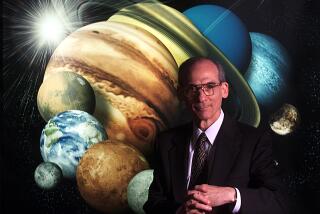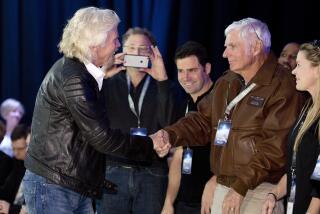. . . Wish You Were Here
- Share via
It is an epochal chapter in the long history of human exploration.
At 9 p.m. on the night of Aug. 24, the spacecraft Voyager 2 will pass within 3,000 miles of the planet Neptune’s cloud-enshrouded north pole. At that moment, 12 years and 4 days into its historic flight, nearly 3 billion miles from its home, the craft will again share with the men who sent it the sights no one has ever seen.
Voyager, the most sophisticated robot ever built, consists of 65,000 different parts and a computer so sophisticated that it can heal itself when damage threatens its mission. But on that day of man’s first encounter with the most distant of the outer solar system’s great planets, the craft will be so far from Earth that, even though they travel at the speed of light, its photographic transmissions home will take 4 hours and 6 minutes to reach the network of 38 antennas on four continents arrayed to receive them.
Voyager is the greatest in a series of unmanned space probes whose accomplishments are unique in the annals of man’s exploration of his physical universe. Their journeys over almost unimaginable distances are adventures of the human mind, but not of the human body. Theirs are the feats of daring intellects and dazzling ingenuity, and not of the body’s courage or endurance, as all such stories of exploration in far places have been before.
In the face of their monumental achievement, man--the creator left behind--also is left to wonder what exactly this new experience is? Is he the prime mover or merely the spectator to the machines’ first great adventure?
Those of a romantic bent might argue that while Voyager has stored up scientific treasure, it has done little to enrich the human spirit--that the project’s triumphal elevation of the machine has degraded mankind from an explorer to a consumer of exploration. That, we think, is a narrow, even vulgar, view, one that reduces adventure to mere sensation and exploration to a kind of trial by combat.
Voyager, in all its magnificent accomplishment, is but the latest reminder of the fact that in all things that really matter, what man’s mind can grasp far exceeds the reach of his frail body.






